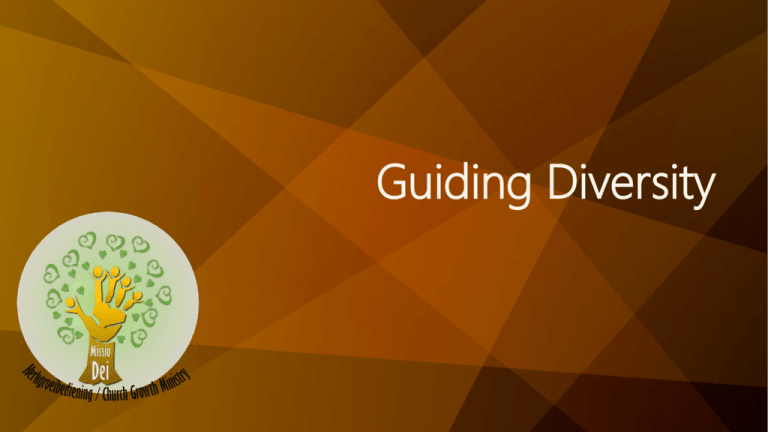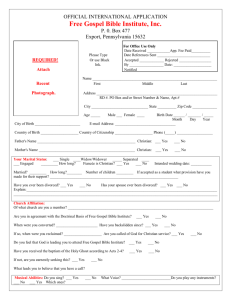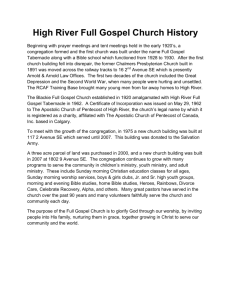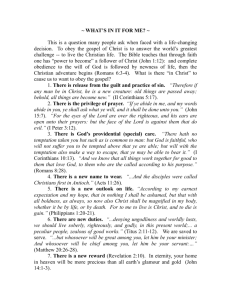Guiding Diversity
advertisement

Guiding Diversity Devotions Revelation 7:9-17 A Great Multitude from Every Nation 9 After this I looked, and behold, a great multitude that no one could number, from every nation, from all tribes and peoples and languages, standing before the throne and before the Lamb, clothed in white robes, with palm branches in their hands, 10 and crying out with a loud voice, “Salvation belongs to our God who sits on the throne, and to the Lamb!” 11 And all the angels were standing around the throne and around the elders and the four living creatures, and they fell on their faces before the throne and worshiped God, 12 saying, “Amen! Blessing and glory and wisdom and thanksgiving and honor and power and might be to our God forever and ever! Amen.” 13 Then one of the elders addressed me, saying, “Who are these, clothed in white robes, and from where have they come?” I said to him, “Sir, you know.” And he said to me, “These are the ones coming out of the great tribulation. They have washed their robes and made them white in the blood of the Lamb. 15 “Therefore they are before the throne of God, and serve him day and night in his temple; and he who sits on the throne will shelter them with his presence. 16 They shall hunger no more, neither thirst anymore; the sun shall not strike them, nor any scorching heat. 17 For the Lamb in the midst of the throne will be their shepherd, and he will guide them to springs of living water, and God will wipe away every tear from their eyes.” 14 I said to him, “Sir, you know.” And he said to me, “These are the ones coming out of the great tribulation. They have washed their robes and made them white in the blood of the Lamb. 15 “Therefore they are before the throne of God, and serve him day and night in his temple; and he who sits on the throne will shelter them with his presence. 16 They shall hunger no more, neither thirst anymore; the sun shall not strike them, nor any scorching heat. 17 For the Lamb in the midst of the throne will be their shepherd, and he will guide them to springs of living water, and God will wipe away every tear from their eyes.” 14 How does this diversity advance God’s purpose to be glorified in his creation? • The beauty power and praise is greater • The greatness of God magnified. • It shows God as the ultimate Leader, King and God. • God undercuts ethnocentric pride. • It points strongly to Christianity being the only true faith and the God of the Bible, being the only true God. Guiding Diversity Expectation in terms of type of diversity Expectation in terms of getting practical Lets “preach” together OUTLINE The Bible and Diversity The Bible and Diversity God loves diversity The implications of these truths for us The fall and sin’s devastating effects on biblical diversity Practical suggestions The hope and restoration Christ brings for restoring biblical diversity God loves diversity Acts 17 Diversity in the Bible Acts 17 - 26 And he made from one man every nation of mankind to live on all the face of the earth, having determined allotted periods and the boundaries of their dwelling place, 27 that they should seek God, and perhaps feel their way toward him and find him. Yet he is actually not far from each one of us, 28 for “ ‘In him we live and move and have our being’; as even some of your own poets have said, “ ‘For we are indeed his offspring.’ God loves diversity Acts 17 Revelation 7 Gen 11 and Gen1 Diversity in the Bible The effects of sin Definitions of culture Diversity in the Bible Culture is popularly conceived narrowly — as language, music and art, food and folk customs — but properly understood, it touches every aspect of how we live in the world. Culture takes the raw materials of nature and creates an environment. When we take the raw material of the earth to build a building or use sounds and rhythms to compose a song or fashion our personal experiences into a story, we are creating an environment we call a culture. We do all this, however, with a goal: to bring the natural order into the service of particular “commanding truths,” core beliefs, and assumptions about reality and the world we live in. (Keller, Timothy J. (2012-09-04). Center Church: Doing Balanced, GospelCentered Ministry in Your City (p. 90). At its simplest level culture can be summarized by the phrase: “It’s the way we do things around here.” The effects of sin “The way we do things around here” becomes “the best way, and the only way of doing things”. Diversity in the Bible . . . every society considers something of supreme worth; accordingly, they seek to bring their environment into service to it . . . and in this sense all cultural work can be said to be “covenantal” — we are all committed to something . . . Romans 1 and 2 get this point across by telling us that all have sinned and fall short of God’s glory —that both Jews and Gentiles alike are lost. The pagan Gentiles may make sensuality an idol, but the Jews make moral righteousness an idol — like every culture, they look to something else to justify and save them rather than God. (Keller, Timothy J. (2012-09-04). Center Church: Doing Balanced, Gospel-Centered Ministry in Your City (p. 108). Zondervan. Kindle Edition.) The effects of sin “The way we do things around here” becomes “the best way, and the only way of doing things”. Diversity in the Bible The power of the Gospel God gives me a new core identity through Jesus and what he did on the cross Diversity in the Bible “[Those] who are not secure in Christ cast about for spiritual life preservers with which to support their confidence, and in their frantic search they not only cling to the shreds of ability and righteousness they find in themselves, but they fix upon their race, their membership in a party, their familiar social and ecclesiastical patterns, and their culture as means of selfrecommendation. The culture is put on as though it were armor against self-doubt, but it becomes a mental straitjacket which cleaves to the flesh and can never be removed except through comprehensive faith in the saving work of Christ. Once faith is exercised, a Christian is free to be enculturated, to wear his culture like a comfortable suit of clothes. He can shift to other cultural clothing temporarily if he wishes to do so, as Paul suggests in 1 Corinthians 9: 19 – 23, and he is released to admire and appreciate the differing expressions of Christ shining out through other cultures.” (Richard F. Lovelace, Dynamics of Spiritual Life (Downers Grove, Ill.: InterVarsity, 1979), 198 – 99.) The power of the Gospel God gives me a new core identity through Jesus and what he did on the cross Diversity in the Bible 2 Corinthians 5 17 Therefore, if anyone is in Christ, he is a new creation. The old has passed away; behold, the new has come. 18 All this is from God, who through Christ reconciled us to himself and gave us the ministry of reconciliation; 19 that is, in Christ God was reconciling the world to himself, not counting their trespasses against them, and entrusting to us the message of reconciliation. 21 For our sake he made him to be sin who knew no sin, so that in him we might become the righteousness of God. 20 Therefore, we are ambassadors for Christ, God making his appeal through us. We implore you on behalf of Christ, be reconciled to God. The implications for us? Broader diversity in our country • We will become excited about Biblical diversity. • We will recon with the fact that the doctrine of sin means that • • our renewed culture are never as good as our renewed worldview should make it. At the same time, the doctrine of our creation in the image of God, and an understanding of common grace, remind us no culture is never as flawed as the false worldview it should make it. Because of this we will become aware of, seek freedom from and the longer the more be freed from cultural blindness and learn to distinguish our specific cultural expression of a biblical principle from the principle itself. • We will also seek to listen, try to understand and seek the good • • • in other cultures before simply condemning practices just because it differs from our own. We will develop an appreciation for different cultures. We will resist to the point of shedding blood all cultural pride, arrogance, judging without the necessary information, racism, feelings of superiority, and feelings of fear that may arise in us when confronted with people from other cultures. We will do this • by identifying and asking the Holy Spirit to reveal the Idols in our own culture, • by laying it before the cross and • by seeking our righteousness, our significance and true identity in Jesus. • We will seek relationships with people from other cultures • • (ethnic and church cultures) because those relationship can help us see our own blind spots and help us to identify idols in our own culture that would have gone unnoticed otherwise. These relationships can also free me from reading my culture into the Bible and hearing only what I want to hear. We will be zealous in our evangelistic effort to be used by the Holy Spirit to bring as many people from as many nations, and tribes and peoples and languages into Gods kingdom and his Church, because we are zealous for receiving all the glory He deserves. Therefore we will become serious about church-planting. • We will ask the Holy Spirit to reveal the Idols of other cultures to • • us as we seek to evangelize them while keeping in mind our own cultures idols and our inclination towards idolatry. We will be confidant enough in our evangelistic effort to confront the idols and evil in other cultures, yet we will do so with a humbleness only the gospel can give. We will be wise in our evangelistic effort, discerning when and in what ways to confirm other cultures and in doing so, break down man made barriers which hinders them from hearing the gospel. The implications for us? Diversity in our denomination • We will recognize that no Church can escape and is not called to • • • escape a cultural form in which it lives out the implications of the gospel. The moment we open our mouths and speak a certain language, we contextualize the gospel to a certain culture, whilst excluding others. We will recognize that it takes more than one type of reformed church to reach all the nations, and tribes and peoples and languages that is pouring into our country and especially the cities. We will become excited about the gift of diversity that God has given us in the GKSA. We will recognize how this gift enables us to bring the gospel to a diverse South-Africa and will therefore celebrate it and cherish it and use it to do this. • We will set apart smaller differences, focus on our many • • similarities and create church-plant networks to plant churches that can reach our country in all its diversity with the gospel. We will keep holding each other accountable to the Word, our confessions and our common agreement but at the same time start to work on a reformed model for contextualization to inform our common agreement so that we do not because of a certain interpretation of our common agreement, inhibit the freedom of sound cultural and circumstantial contextualization. We will endeavour to work hard at distinguishing principle form cultural from and enter into conversations with churches that do differ from us to help us do so and also to help us to be confronted with all that the bible says on a specific issue! • We will, with our true identity centred in Christ seek to enter • • into conversation with Churches that do things differently and really listen, try to understand and give them the benefit of the doubt especially in terms of their motives, until they have proven it to be otherwise. We will resist to the point of shedding blood all pride, arrogance, feelings of superiority, tendency to judge without all the necessary information and feelings of fear that may arise in us when we hear of congregations doing things differently. When we do get to a point where we need to confront another church because we believe they are forsaking Christ, we will do so with a humbleness only the gospel can give and therefore keep in mind our own faults and flaws. The implications for us? Diversity in a congregation • All the points above can be applied on a personal level and for • • instance the cultural differences between the older and younger generation within a congregation. I do think that our deputies for unity and diversity did a very good job in their report to the Synod of giving guidance from Rom 15 for how to handle differences and protecting the unity within a specific congregation. It will be wise for us as white ministers to enter into conversation with our black pastor friends who has been guiding great diversity within their congregations for many years. Go and ask them there wisdom and insights. What can we go and do when we walk out the door today • Preach and teach about God’s love for diversity, his image in all • • • people, the effect of the fall on all cultures and the result: that there’s good and evil in all cultures. Get people excited about how diversity and the diversity we have within the broader GKSA enables us to fulfil the great commission and be a truly missional church. Confirm the good things of the dominant culture in your church but confront the dominant Idols of that culture so that this enables people to look at other cultures in the same way. Create opportunities for cross cultural exposure, engagement and conversation and also engagement between congregations that differ from each other in practice and listen to each other carefully. • Broader Diversity within society: Confront the sin of racism, • cultural superiority and cultural pride head-on and show how the gospel saves us from this and enable us to change (Jonah is a good book to preach from). Diversity amongst congregations in a denomination: Confront the sin of congregationalism head-on and show how the gospel saves us from this and enable us to change. Pastors and congregations gossiping about each other and people speaking ill of other congregations and pastors without speaking to the congregations themselves is a death blow to church growth. Develop a culture of speaking the truth in love. • Diversity in a congregation: • Confront the sin of classism and feelings of superiority and inferiority when it comes to levels of income, social status and personality differences head-on and show how the gospel saves us from this and enable us to change. All of the above must be aided by teaching people and congregations how to seek their righteousness in Christ functionally and not only theologically. The final apologetic “ . . . without true Christians loving one another, Christ says the world cannot be expected to listen, even when we give proper answers. Let us be careful, indeed, to spend a lifetime studying to give honest answers. For years the orthodox, evangelical church has done this very poorly. So it is well to spend time learning to answer the questions of men who are about us. But after we have done our best to communicate to a lost world, still we must never forget that the final apologetic which Jesus gives is the observable love of true Christians for true Christians.” (Francis Schaffer, The Great Evangelical Disaster, pgs. 164-165 Cf. The Mark of the Christian, p 14-18.) The final apologetic Guiding Diversity Discussions









